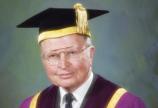In Memoriam: Dr. Bill Gibson

Dr. William C. (Bill) Gibson, former chancellor and avid supporter of the University of Victoria, renowned medical historian, professor, neurophysiologist and civic leader, died on July 4 in Victoria. He was 95.
Gibson was born in Ottawa. He grew up in Victoria and graduated from UVic’s predecessor institution, Victoria College, in 1931. He received a BA from the University of British Columbia in 1933, an MSc (1936) and an MDCM (1941) from McGill University and a DPhil from Oxford University in 1938.
Gibson served with distinction in the Royal Canadian Air Force, starting as deputy director of medical research during the Second World War and rising through the ranks to wing commander and senior medical officer for Vancouver in 1960.
A specialist in neurology and psychiatry, Gibson taught at the University of Sydney, the University of California, Yale University, Stanford University and—from 1950 to 1978—at UBC, where he played a key role in developing the Faculty of Medicine and creating the Woodward Biomedical Library. He served as professor and director of the Kinsmen Laboratory for Neurological Research, professor of psychiatry and head of the Department of History of Medicine and Science. From 1978 to 1984 he was chair of the Universities Council of British Columbia.
Over a long and productive scholarly career, Gibson published more than 125 scientific papers and 10 books. Among his earliest books was Young Endeavour: Contributions to Science by Medical Students of the Past Four Centuries (1958), and his last was Old Endeavour: Scientific and Humanitarian Contributions by Physicians Over Age 65 (2007).
UVic has benefited from Gibson’s long association with the university. In the late seventies, Gibson envisaged a new type of professional who would have the knowledge and skills to introduce information technology into Canada’s health care system. His advocacy was instrumental in the creation of UVic’s ground-breaking School of Health Information Science in 1982, and he is acknowledged as its “intellectual founder.”
Elected the sixth chancellor of the University of Victoria in 1985, he served for two terms until 1990, conferring some 12,000 degrees.
His long and distinguished record of community service involved work with many societies in the health care area, including the Canadian Mental Health Association, Cedar Lodge School for Brain-injured Children, the Terry Fox Foundation of BC, the BC Cancer Control Agency and the Muscular Dystrophy Association of the US. He served as chair of the advisory board for the UVic Centre on Aging and maintained close ties with the Faculty of Education and the School of Music.
Gibson’s many honours include the BC Centennial Medal (1967), the Queen’s Jubilee Medal (1977), an honorary doctorate from UVic (1991), and the Order of Canada (2002).
His many contributions to the university community serve as a living legacy rooted in his generosity of spirit and keen interest in the education of young people, particularly in the disciplines of medicine.
A large plane tree growing between the Cunningham and MacLaurin buildings stands as a vital symbol of his legacy. It was grown from a seedling—the descendant of a tree on the Greek Island of Kos under which Hippocrates lectured his students in medicine—provided by Gibson and which he helped plant in May 1970 to celebrate the 75th anniversary of the Victoria Medical Society.
The university community will miss greatly this energetic, dedicated and principled friend.

